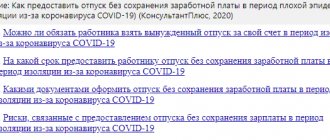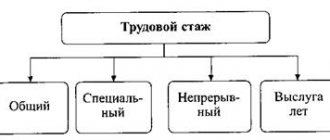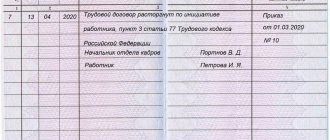Has a new law on unused vacation for the past year been adopted in 2021 and does vacation expire?
Among the innovations in legislation that became relevant in 2019-2020, we highlight the addition of the Labor Code of the Russian Federation with a new article 262.2, which gives the right to employees with three or more children under 12 years of age to choose the time of vacation at their request.
At the same time, the changes made do not resolve the contradictions when deciding whether unused vacation for previous years is burned. The essence of the contradictions lies in the fact that the mutually exclusive norms of Article 124 of the Labor Code of the Russian Federation and paragraph 1 of Article 9 of the ILO Convention “On Paid...” of June 24, 1970 No. 132 apply to this situation. A new law regarding whether vacation that has not been taken off will be expired , not accepted; legal regulation remains the same.
Part 4 of Article 124 of the Labor Code of the Russian Federation establishes a ban on non-provision of leave for 2 years in a row, as well as on minor employees working in hazardous conditions.
At the same time, the norms of the Labor Code of the Russian Federation do not indicate that vacation unused for any reason for previous years is burned out.
In turn, paragraph 1 of Article 9 of the Convention indicates that the balance of annual leave must be used within 18 months from the end of the year in which it was due to the employee.
However, this rule does not mean that 18 months after the past year in which the employee was not granted leave, the right to it is canceled. It should be interpreted to mean that the employer grants leave to the employee as early as possible.
What to do if an employee has not gone on vacation for 2 years in a row? The answer to this question is in the ConsultantPlus system:
If you don't have access to K+, get a free online trial.
Compensation for vacations that were not previously used
As it became known, unused vacation does not expire and does not go anywhere.
Days that are not used do not disappear. But the law prohibits accumulating more than necessary. The Code also establishes that a manager cannot refuse to provide time for rest. Such a violation may result in a fine of at least 50 thousand rubles.
Until recently, it was possible not to go on vacation, but to get money for it. Currently, only those who have a vacation duration of more than 28 days per year can receive compensation for vacation - these are, for example, extended or additional vacations. If an employee is only entitled to vacation of 28 calendar days, then it is impossible to replace part or all of this vacation with money! Vacation cannot generally be postponed for more than 24 months. And it is no longer profitable for management to accumulate vacation days.
This is due to several reasons:
- When checking, the Labor Inspectorate may ask many unnecessary questions.
- The more unused vacation an employee accumulates, the more the company will incur costs for compensation.
But employers often still try to reduce rest time. For this purpose, several techniques are used:
- Vacation is given, but it starts on Friday. That is, legal days off are added to the days of rest.
- The employee is not allowed to rest at all, but is asked to write a statement, for example, on weekends.
- The leave is issued, but in fact the employee continues to perform his duties.
These methods cannot be called effective. The management of the enterprise convinces that an employee can receive two payments at once - wages and vacation pay. And in this case, the employee loses the right to legal rest.
How to properly grant leave so as not to be held administratively liable
It is recommended to avoid situations where an employee accumulates unused vacation in order to avoid the possibility of administrative liability. A practical solution may be to provide the employee with the required 28 or more days of vacation each year, either as scheduled or according to his wishes.
In the event that the employee does not use vacation for any reason, next year the schedule must provide in advance the number of vacation days, taking into account those unused last year.
REFERENCE: according to Part 2 of Article 123 of the Labor Code of the Russian Federation, a vacation schedule is mandatory for the employee. However, we should not forget that certain categories of employees have the right to determine the time of vacation at their own request; for example, Article 262.1 of the Labor Code of the Russian Federation gives this right to a parent raising a disabled child. At the same time, the right to determine the vacation time does not allow the employee to reduce it and thus accumulate unused balances from previous years.
Compensation for unused vacation when going on maternity leave
The law allows pregnant women to extend the period of maternity leave by increasing its duration using unused vacations:
| Indicators | Methods of use |
| If an employee has well-deserved but unused annual leave | add the required vacation days to the sick leave |
| extend the period of maternity leave, that is, leave maternity leave as much later as unused leave allows | |
| take vacation in advance, that is, by agreement with the employer, ask for early use of the vacation provided by law against future periods |
The last option is the least popular with the employer, since there is no guarantee that the employee will return from maternity leave after 1.5 or 3 years and work out the paid period (
Is an employee entitled to compensation if he did not take vacation for the past year?
Another way to resolve the issue of accumulated vacation balances is to pay compensation. According to Part 1 of Article 126 of the Labor Code of the Russian Federation, if the vacation entitlement to an employee (including taking into account balances for previous periods) exceeds 28 days, then the difference can be replaced at the request of the employee with monetary compensation.
NOTE! This rule does not apply to pregnant women, employees under 18 years of age, or workers in hazardous industries. The persons listed must use their vacation in full.
The amount of compensation is calculated in the same way as vacation pay - based on the employee’s average daily earnings and the number of vacation days not taken.
Do not forget that, according to Article 127 of the Labor Code of the Russian Federation, upon dismissal, an employee is entitled to compensation for all days of unused vacation without restrictions.
In what cases it is impossible to replace vacation with monetary compensation and how to calculate it correctly in permitted cases, find out in the ConsultantPlus system. If you do not have access to K+, get a trial demo access and proceed to the explanation and calculation example for free.
Calculation of the number of vacation days upon dismissal
To calculate the vacation period upon dismissal of an employee, it is necessary to make the following calculations, which are presented in the table:
| Stage number | Index | Calculation algorithm |
| Stage 1 | Determination of length of service in months | Only those months in which professional activity lasted more than 15 days are taken into account. |
| Stage 2 | Determining the number of vacation days per month worked | The total duration of annual vacation is divided into 12 months (28/12) |
| Stage 3 | We determine the total amount of vacation for the entire length of service | length of service in full months is multiplied by the number of vacation days in 1 month |
| Stage 4 | Definition of unused vacation | The vacation already used is subtracted from the total amount of vacation. |
The peculiarity of calculating vacation compensation is that not calendar months, but working months are taken into account. The working year begins to be counted starting from the day of hiring.
If for one full working year there are 28 calendar vacation days, then for 1 full month there are 2.33 days.
Example: Sokolov was hired on 02/01/2014. Resigns on February 28, 2017. The length of service for calculating the vacation period is 3 years 1 month. During this period, Sokolov was on annual paid leave 2 times, 28 days each. Only 56 days. It is required to calculate the days of compensation for unused vacation upon dismissal.
Calculation:
3 years and 1 month. - that's 37 full months.
If 1 year is 28 calendar days, then 37 months is 37*2.33 = 86.21 days.
Sokolov managed to take 56 days off, which means the number of days of unused vacation is 30.21 days.
30.21 days can be rounded up to 31 or not rounded at all.
for the specified days you need to pay monetary compensation, for which the average earnings for the year are multiplied by the number of unused days. The result of the calculations will be monetary vacation compensation paid upon dismissal.
Results
Thus, in matters of burning out vacation time, one should take into account not only the provisions of Article 124 of the Labor Code of the Russian Federation, but also the more stringent norms of the ILO Convention. Vacation does not expire in any case, however, we recommend that employers avoid situations where an employee has days of vacation left, since in this case there is a possibility of receiving an administrative fine.
Sources:
- Labor Code of the Russian Federation
- Convention of the International Labor Organization “On paid holidays” dated June 24, 1970 No. 132
You can find more complete information on the topic in ConsultantPlus. Free trial access to the system for 2 days.
Last year's vacation on schedule
How to properly grant last year's leave? At the request of the employee or by inclusion in the schedule? There are supporters of both methods.
The first refer to Article 124 of the Labor Code of the Russian Federation: it states that the transfer of vacation is carried out upon application . Another part of accountants and personnel officers believe that this does not exclude the need to include “overdue” vacation in the schedule. After all, the employee may not write a statement, and then there will be no other grounds to send him on leave.
Article 124 deals with a situation where the employer did not warn the employee 2 weeks in advance and did not give him vacation pay. In this case, indeed, the employee should receive a leave application.
Employer Responsibilities
Unused vacations carry over to the next year, so workers don’t have to worry about it. In this matter, the law is completely on the side of the employees. However, officials may reschedule leave if there are compelling reasons. The employer must notify subordinates of the opportunity to take annual paid leave, and also provide a choice of periods for rest. An employee can independently choose the date on which it is better to assign a day off. At the same time, the employer acts as a guarantor that unused vacation for the previous year will not be burned, but will be accumulated in the schedule.
If personnel rest in accordance with the established document, then the risk of production collapse is minimal. Otherwise, people will go on vacation in a chaotic manner, which will lead to disruptions in the work process. Do employees who have worked for the benefit of the company for several years lose their holidays from previous years? It is important to remember that long-term work has a negative impact on a person’s attitude towards work and health.
Vacation or compensation?
Often workers take monetary compensation instead of annual vacation pay. Of course, this does not mean that leave from previous years can be permanently exchanged for a refund. The law states that compensation is paid to citizens who have accumulated more than 28 days of calendar leave. This also applies to employees who decide to terminate their employment contract with the company. In other words, employees who have an extended vacation period, as well as those who want to quit, are entitled to receive monetary compensation.
Employer's liability
In fact, within the framework of the law, the formation of unused rest is not a violation , but only if the worker had the opportunity to rest for at least two weeks a year with the obligatory condition of implementing the rescheduled rest over the next two years.
Moreover, if, in violation of the norms of Article 124 of the Labor Code of the Russian Federation, legal rest was not provided at all , and for more than two years in a row, the company management will be subject to punishment in the form of an administrative penalty, which is expressed in penalties based on Article 5.27 of the Code of Administrative Offenses of the Russian Federation in the amount of 30 up to 50 thousand rubles.
Of course, every employer strives to ensure that its employees work, and therefore make a profit, constantly, which is why vacation debt for previous years is formed.
But, nevertheless, no amount of money, as well as production needs, can replace proper rest, which is provided by law for a reason, but in order to preserve the health and ability of workers.
For information about unused legal periods of exemption from work, see the following video:
Employee Responsibilities
The employee must notify the employer in advance of his desire to take an annual day off. Moreover, this must be reported no earlier than two weeks in advance. Part of the vacation cannot be burned, in accordance with the Labor Code of the Russian Federation and other adopted regulations. The question of whether vacation from previous years expires worries workers, since people sometimes fail to use it to the fullest. Today this problem is discussed quite often. In this article we will look at the very concept of “remaining days” and the main ways to use them.
So, the Constitution of the Russian Federation guarantees the right of workers to legal leave at the place of work. This provision is also enshrined in the Labor Code. The law defines various forms of leave and situations for their provision. Every working person can take an annual paid holiday. Additional days may be provided due to work under special conditions. These include working in hazardous work, irregular working hours, etc. Many people are interested in whether additional vacations from previous years expire and how they can be used? It is important to remember that they are subject to the same rules as regular ones. Additional days can be added to an upcoming or current vacation. Upon dismissal, the employee is required to pay compensation for these days.
An employee may take unpaid leave, also called “administrative leave.” It is used by workers if there is a need to leave for several days. In this case, the employer may refuse to provide the employee with such leave. However, the Labor Code establishes some exceptions in which the application must be signed. This is the birth of a child, a wedding or the death of a loved one.
In what order should holidays be granted for past periods?
The Labor Code does not say in what sequence vacations not used in previous periods should be granted. In practice, experts use two different approaches.
The first approach implies that you first need to provide vacation for the current period, and only after that move on to “overdue” vacations. Proponents of this approach argue as follows: since, according to Article 122 of the Labor Code of the Russian Federation, leave must be granted annually, the current period has priority. An additional argument is the letter of Rostrud dated 01.03.07 No. 473-6-0. It contains the following phrase: “Labor legislation does not contain provisions providing for the use of vacations for working periods in chronological order.” This means that vacation for later periods can be taken before vacation for earlier periods is used.
The second approach, in contrast, is to grant leaves in chronological order. Let's illustrate with an example. Let's say an employee did not take vacation for 2012, 2013, and so on until today. In this case, the employer must first give leave for 2012, then for 2013, and so on. Holidays for 2021 will be the very last. The basis here is the fact that, thanks to the chronological order, “old debts” are reduced, and the employer gradually corrects the violation. At the same time, the requirement of Article 122 of the Labor Code of the Russian Federation was met, because vacation was granted this year. This approach does not contradict Rostrud letter No. 473-6-0, since this letter does not directly prohibit chronological sequence.
In our opinion, both approaches are acceptable. The employer needs to choose the one that seems more acceptable to him and enshrine it in local regulations (for example, in the order of the manager).










